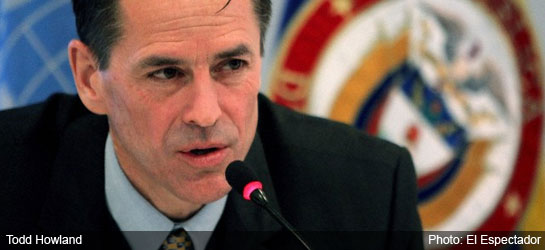
A constitutional amendment expanding the jurisdiction of military tribunals could lead to interventions by the International Criminal Court (ICC), warned the U.N. on Sunday.
The amendment proposed before the Senate establishes that crimes committed by members of the security forces will be tried by military courts rather than the ordinary criminal justice system.
According to Todd Howland, the United Nations High Commissioner for Human Rights in Colombia, if the amendment passes, Colombia could lose its standing in international courts.
“If this reform happens,” said Howland, “You will have formal complaints to the International Commission and then to the [International Criminal] Court.”
Additionally, ratified and pending trade agreements with the European Union, the United States and Canada are at stake, said the U.N. official.
“There is great possibility…that [this proposed amendment would] violate clauses of the FTA,” said the U.N. commissioner.
Last week, more than 230 organizations demanded that the Colombia’s government withdraw the proposal because according to them it would grant “impunity for serious human rights abuses and undermine international humanitarian law.”
“This reform…far from strengthening the work of the regular courts… is promoting changes that will benefit military and police involved in grave violations of human rights and breaches of international humanitarian law,” wrote the activists.
The U.N. and human rights groups have argued against the amendment since its inception last year.
Late last month, the U.N. stated that the reform would, “imply a significant retrogression in the efforts carried out by the Colombian State to overcome and prevent repetition of the notorious human rights violations committed in the past,” and “foster a climate of impunity.”
The possible economic ramifications implied by Howland, however, mark the first time the U.N. has made any direct threats against Colombia should the polarizing amendment pass.
Thousands of members of Colombia’s security forces are under investigation for the extrajudicial killing of at least 3,000 civilians.

